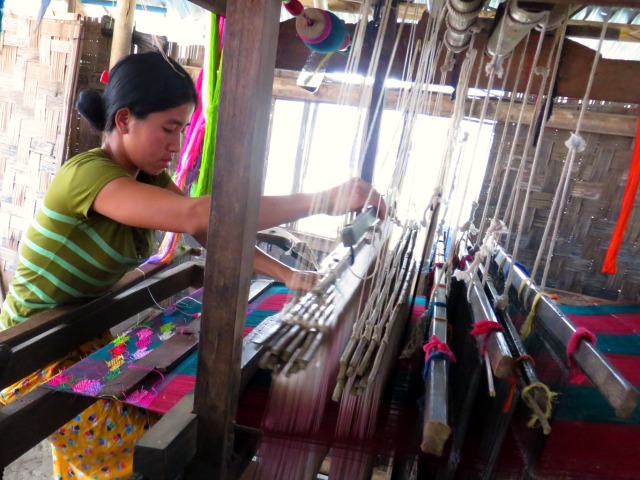Since 2011, the government of Myanmar has been involved in a low-intensity conflict with an internal ethnic insurgency, the Kachin Independence Army. With elections in early 2016, there is renewed hope of a peaceful settlement of the conflict.
Nonetheless, an estimated 96,400 people in Kachin and northern Shan states remain displaced as a result of the armed conflict that re-ignited in 2011. Approximately half of the displaced populations live in areas beyond government control, where local and national NGOs have access but most international organisations do not.

The weaving businesses give people hope of once again having a steady income. Photo by John Coughlin/Caritas
While many of the displaced are living in camps that are being managed by national NGOs, others still live in crowded conditions in temporary accommodation that was not designed to house people for a protracted period of time. Supported by a range of sister Caritas organisations from around the world, Caritas Myanmar provides services to over 16,000 displaced people in both government controlled and non-government controlled areas.
On my mission to visit Caritas’ project helping the people forced to flee the conflict, I spoke to Thein Thein Khein, an 40 year old woman living in St. Joseph Maina Camp, outside Myitkyina Town in northern Myanmar.
Four years ago, as fighting raged near her village, Thein Thein fled with her sister He Ma Moh, 38 years old. In their home village of Nansiam, they ran a mini-market. Fleeing with only what they could carry, they came to Myitkyina, where they found refuge at St Joseph Maina Camp, which is managed by Caritas Myanmar.
At the camp, displaced people themselves run and monitor the quality of services provided. Thein Thein is the Camp Focal Point, which is a full-time job and gives her a chance to earn money. The Focal Point’s job is to ensure coordination with internally displaced people (IDPs), Caritas and the other agencies providing services in the camp.
She is in constant contact with camp residents so she is always up-to-date about their needs and concerns. Thein Thein also assists in accompanying visitors to the camp, ensuring camp cleanliness, providing support to the other camp committees, for example, food, education and sanitation. Thein Thein said, “I’m happy that Caritas has provided for people’s most urgent basic needs in a timely fashion”.
She also tries to assist fellow displaced people with their complaints. The most frequent are about food quantity, as budget constraints only allow for a limited contribution to household’s total needs and discrimination against students when they go to local schools – they are seen as outsiders and sometimes treated badly by other children and teachers.
Thein Thein hopes that in the future she will be able to receive livelihood recovery assistance. In light of limited financial support, livelihood assistance such as for training in weaving for women is restricted to only the most vulnerable households. In this part of the project, women learn how to use a loom and basic business skills.
The weaving businesses that have been set up are much appreciated and give people hope of once again having a steady income and depend less and less on services provided by Caritas. Thein Thein believes that these skills will help her to re-locate to a village where she can live in peace.
